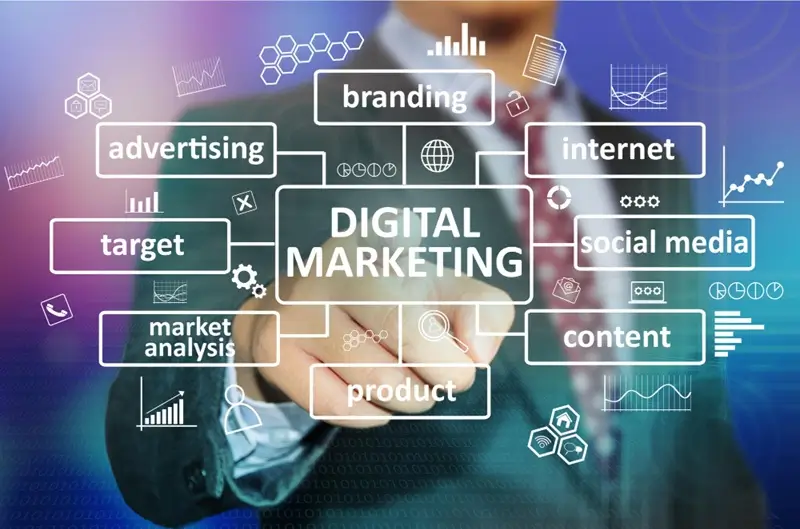
Digital Marketing Usage in Business
In today's digital world, every business uses online platforms to reach new heights, whether small or large. At present, digital marketing can be summarized as a bedrock of all modern business strategies as long as such tools and techniques it holds to increase visibility, stimulate engagement, and bring revenue. Let's see in this blog how digital marketing is used in business, why it is essential, and how it may become a game changer for your brand.
1. Increase Brand Awareness
Perhaps the most crucial element to introducing digital marketing to business is awareness or recognition. Companies can get more people exposed to their names via strategic online presence. The opportunity to market products, services, and uniqueness lies in social media, search engines, and content marketing for businesses worldwide. Given a constant stream of digital marketing efforts, even the smallest business can level the playing field in front of the larger corporations with an online, recognizable brand.
Example:
A firm that is handling eco-friendly commodities can use online media to tell the sustainability story and interact with customers who have concerns towards environmental issues. Such accountability creates brand recognition over time.
2. Targeted Traffic Drive
The old ways of marketing, though pretty wide and inclusive other words, perhaps commercials during television programs or billboards- would probably lack the ability to target the proper customer group for a business. Digital marketing, however, gives the ability to target the proper customer group for a business. SEO, PPC advertisements, as well as social media help drive relevant, actively interested, or already searching people to your website.
Example:
An exercise company can use SEO techniques to ensure that its website tops search terms like "best workout routines" or "home fitness equipment," thereby getting highly targeted traffic to its website. The same company can further hone its target audience using paid advertisements based on age group, region, or other interest categories.
3. Customer Engagement Balancing Act
Unlike the conventional marketing route, which often concludes with a one-way message towards an audience, digital channels offer bidirectional communication. A firm is enabled to communicate directly with its customers through real-time channels such as social media, email newsletters, and blogs. Interaction directly establishes customer relationships, builds confidence, and provides the company with useful feedback.
Example:
A restaurant can use social media like Instagram to share mouth-watering pictures of dishes, comment on posts, interact with followers, and respond to customer queries. Such constant communication keeps the audience interested and engaged.
4. Lead and Conversion Generation
The general design of the digital marketing strategy should be to convert visitors into leads and leads into customers. Landing pages, email marketing campaigns, and retargeting ads are specific techniques for leading prospects through a sales funnel from the awareness stage to the conversion stage. This enables companies to nurture relationships and drive sales.
Example :
An online clothing retailer can utilize personalized email campaigns in which it suggests a product to the customer based on what they have purchased or browsed previously. Such tactics are sure to change a potential lead into a paying customer.
5. Cheap Marketing Options
For companies with small marketing budgets, digital marketing may come in as a great saviour in terms of reducing costs significantly compared to traditional channels such as print or television advertising. Social media sites, email marketing, and SEO can be utilized relatively especially in comparison to the expense of TV advertisements or mailers.
Example:
A local beauty salon could use Instagram as a means to present services, offer promotions, and communicate with customers for the price of developing and publishing content. This can amount to more bookings and word-of-mouth publicity without necessarily making huge investments.
6. Real-time analytics reporting
Perhaps what stands out most in digital marketing, however, is the timeliness of tracking and measuring success. With Google Analytics, social media insights, and CRM software, businesses can now see exactly how their marketing efforts are performing. Individual metrics like click-through rates, conversion rates, and customer behaviour give invaluable insights into what works and what doesn't so that businesses can make informed decisions.
Example:
Thus, an e-commerce website can know why people stop completing purchases, by analyzing user behaviour. The causes like the difficult checkout process or high shipping costs can be identified and corrected by the company to reduce cart abandonment and boost sales.
7. International Reach
Through digital marketing, the world is indeed your oyster. Whether you happen to be a local business or a global enterprise, the internet gives you a gateway to reach audiences much wider than you ever could before. Search engines and social media can make businesses connect with potential customers from around the world, providing you with market expansion opportunities that have never been possible before.
Example:
For instance, a small-town handmade jewellery company can sell its products on an e-commerce website like Etsy, using online marketing to promote the shop itself. This would be nearly impossible without the aid of modern digital marketing tools.
8. Building Credibility and Trust
Digital marketing assists businesses in becoming an authority in their niche. This is because constant informative and valuable content shared makes the business position the minds of the potential customers as experts. Any type of blog, video, or case study establishes expertise. Moreover, good feedback and reviews also generate trust with potential customers.
For example:
Good credibility will be built, and people will gain trust in knowing the software company always offers in-depth guides and whitepapers about technology trends. All this authority can therefore amplify credibility and loyalty to customers.
9. Leverage Automation for Efficiency
Most of these digital marketing tools allow automation, meaning all that wasted time is saved with increased efficiency. Email marketing platforms automatically send specific e-mail messages while social media scheduling tools ensure a business does not sleep in terms of managing their social media pages without necessarily inputting it manually.
Example :
An online business can use an email marketing automation system to send targeted birthday offers or offers after some particular purchase. This sort of automation saves effort and yet nurtures customer relations.
10. Staying Competitive
The speed and interconnectivity of cyberspace necessitate keeping pace with new digital marketing trends and tools to stay ahead of the pack. Those businesses not embracing digital marketing will be bypassed by competitors who do. Investment in digital marketing can keep businesses competitive, and even let them gain a step on competitors through faster, more effective strategies at customer acquisition.
Example:
A hotel that is constantly using digital marketing, as through special discounts using retargeting ads, will most certainly book more clients than a competitor that only uses traditional marketing campaigns, such as print ads or brochures.
Conclusion
Digital marketing is no longer a luxury for businesses looking to thrive in this highly competitive marketplace. Since digital marketing brings old and new ways to advertise more about brands, generate leads, increase customer engagement, and provide cost-effective solutions to your business goals, it is essential for achieving prosperous business success in any kind of setting - whether you are a startup or an established brand - proper use of digital marketing can help catalyze exponential growth and secure your place in the industry.






